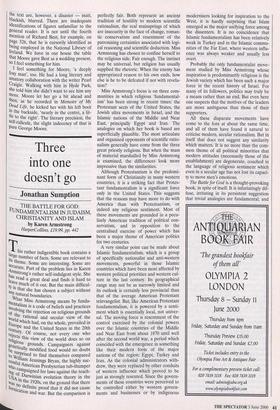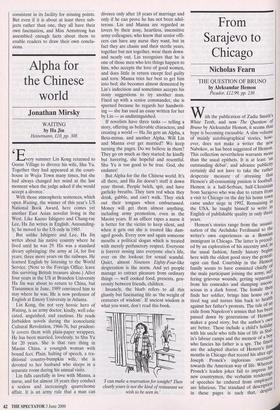Three into one doesn't go
Jonathan Sumption
THE BATTLE FOR GOD: FUNDAMENTALISM IN JUDAISM, CHRISTIANITY AND ISLAM by Karen Armstrong HarperColilins, £19.99, pp. 442 This his rather indigestible book contains a its number of facts. Some are relevant to as theme. Some are interesting. Some are accurate. Part of the problem lies in Karen Armstrong's rather self-indulgent style. She has read a great deal and finds it hard to leave much of it out. But the main difficul- t' is that she has chosen a subject without any natural boundaries. What Miss Armstrong means by funda- mentalism is a code of beliefs and practices Involving the rejection on religious grounds of the rational and secular view of the Europe which had, on the whole, prevailed in and the United States in the 20th century. Of course, not every one who 'ejects this view of the world does so on r cligious grounds. Campaigners against Pnetically modified food would no doubt I°e surprised to find themselves compared coe William Jennings Bryan, the highly suc- missful American Presbyterian tub-thumper in 13 campaigned for laws against the teach- USA of Darwinian evolution theory in the in the 1920s, on the ground that there fnas no definite proof that it did not cause 'rnication and war. But the comparison is perfectly fair. Both represent an ancient tradition of hostility to modern scientific rationalism, the real mainsprings of which are insecurity in the face of change, roman- tic conservatism and resentment of the patronising certainties associated with logi- cal reasoning and scientific deduction. Miss Armstrong has chosen to confine herself to the religious side. Fair enough. The instinct may be universal, but religion has usually supplied the rhetoric. When the enemy has appropriated reason to his own ends, how else is he to be defeated if not with revela- tion?
Miss Armstrong's focus is on three com- munities in which religious 'fundamental- ism' has been strong in recent times: the Protestant sects of the United States, the Jewish ultra movements in Israel, and the Islamic nations of the Middle and Near East, principally Egypt and Iran. The analogies on which her book is based are superficially plausible. The most articulate and organised opponents of scientific ratio- nalism generally have come from the three great priestly religions. But when the mass of material marshalled by Miss Armstrong is examined, the differences look more impressive than the similarities.
Although Protestantism is the predomi- nant form of Christianity in many western countries, it is a striking fact that Protes- tant fundamentalism is a significant force only in the United States. This suggests that the reasons may have more to do with America than with Protestantism, or indeed any religious sentiment. Most of these movements are grounded in a pecu- liarly American tradition of political con- servatism, and in opposition to the centralised exercise of power which has been a major theme of American politics for two centuries.
A very similar point can be made about Islamic fundamentalism, which is a group of specifically nationalist and anti-western movements, powerful in those Islamic countries which have been most affected by western political priorities and western cul- ture in the last century. Its geographical range may not be as narrowly limited and its outlook is certainly less provincial than that of the average American Protestant televangelist. But, like American Protestant fundamentalism, it is powered by a senti- ment which is essentially local, not univer- sal. The moving force is resentment of the control exercised by the colonial powers over the Islamic countries of the Middle and Near East from about 1870 until well after the second world war, a period which coincided with the emergence in something like their modern form of the major nations of the region: Egypt, Turkey and Iran. As the colonial administrators with- drew, they were replaced by other conduits of western influence which proved to be just as strongly resented. Since the govern- ments of these countries were perceived to be controlled either by western govern- ments and businesses or by indigenous modernisers looking for inspiration to the West, it is hardly surprising that Islam emerged as the major unifying force among the dissenters. It is no coincidence that Islamic fundamentalism has been relatively weak in Turkey and in the Islamic commu- nities of the Far East, where western influ- ence was always weaker and usually less overt.
Probably the only fundamentalist move- ment studied by Miss Armstrong whose inspiration is predominantly religious is the Jewish variety which has been such a major force in the recent history of Israel. For many of its followers, politics may truly be a means rather than an end. But even here one suspects that the motives of the leaders are more ambiguous than those of their supporters.
All these disparate movements have come to the fore at about the same time, and all of them have found it natural to criticise modern, secular rationalism. But in itself that does not suggest any similarity which matters. It is no more than the com- mon theme of all political minorities that modern attitudes (necessarily those of the establishment) are degenerate, couched in the language of religious sentiment which even in a secular age has not lost its capaci- ty to move men's emotions.
The Battle for God is a thought-provoking book, in spite of itself. It is infuriatingly dif- fuse, irritating in its persistent suggestion that trivial analogies are fundamental, and consistent in its facility for missing points. But even if it is about at least three sub- jects rather than one, they all have their own fascination, and Miss Armstrong has assembled enough facts about them to enable readers to draw their own conclu- sions.






































































 Previous page
Previous page